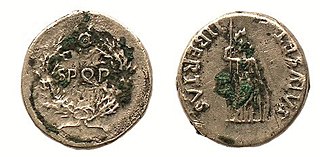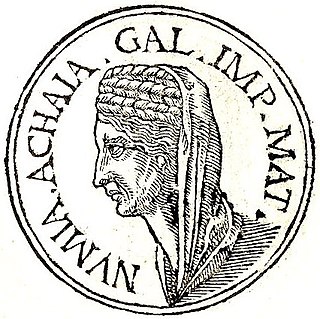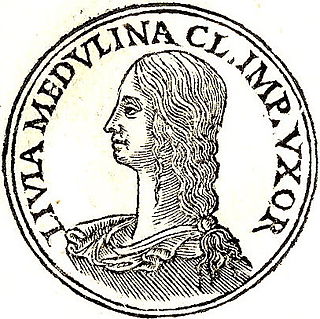Related Research Articles

Galba was Roman emperor, ruling for 7 months from 8 June AD 68 to 15 January 69. He was the first emperor in the Year of the Four Emperors and assumed the throne following Emperor Nero's suicide.

Gaius Julius Vindex, was a Roman governor in the province of Gallia Lugdunensis. He was of a noble Gallic family of Aquitania and was one of the men belonging to a faction of Empress Agrippina, the mother of Nero. Vindex had taken part in a conspiracy against the emperor in 59.

Antonia the Elder was a niece of the first Roman emperor, Augustus, being the eldest daughter of Octavia the Younger and her second husband, the Triumvir Mark Antony. She married Lucius Domitius Ahenobarbus and became the paternal grandmother of the emperor Nero.

The gens Livia was an illustrious plebeian family at ancient Rome. The first of the Livii to obtain the consulship was Marcus Livius Denter in 302 BC, and from his time the Livii supplied the Republic with eight consuls, two censors, a dictator, and a master of the horse. Members of the gens were honoured with three triumphs. In the reign of Augustus, Livia Drusilla was Roman empress, and her son was the emperor Tiberius.
The gens Sulpicia was one of the most ancient patrician families at ancient Rome, and produced a succession of distinguished men, from the foundation of the Republic to the imperial period. The first member of the gens who obtained the consulship was Servius Sulpicius Camerinus Cornutus, in 500 BC, only nine years after the expulsion of the Tarquins, and the last of the name who appears on the consular list was Sextus Sulpicius Tertullus in AD 158. Although originally patrician, the family also possessed plebeian members, some of whom may have been descended from freedmen of the gens.
Publius Rutilius Rufus was a Roman statesman, soldier, orator and historian of the Rutilia gens, as well as a great-uncle of Gaius Julius Caesar. He achieved the highest political office in the Roman Republic when he was elected consul in 105 BC.
Aemilia Lepida is a Latin feminine given name that was given to the daughters of various Aemilius Lepiduses, men belonging to the Lepidus branch of the Aemilia gens (family) that was founded by the Marcus Aemilius Lepidus who served as consul in 285 BC. The Aemila Lepidas who appear in Roman historians were principally known for their engagements and marriages, with those in the late Republic and early Empire related to the Julio-Claudian dynasty.

Mummia Achaica was the mother of the Roman Emperor Galba and his elder brother Gaius. She was the granddaughter of the consul Quintus Lutatius Catulus through his daughter Lutatia. Her father's name was Lucius Mummius Achaica which made her a great-granddaughter of the general Lucius Mummius Achaicus.
Marcus Livius Drusus Claudianus was a senator and praetor of the Roman Republic. He was born with the name Appius Claudius Pulcher, into the patrician family of the Claudii Pulchri but adopted by a Livii Drusi as a small child. His daughter Livia Drusilla became the wife of the first Roman Emperor Augustus, and he was a direct ancestor of the Julio-Claudian emperors Tiberius, Caligula, Claudius and Nero.

FuriaLivia Medullina Camilla was the second fiancee of the future Emperor Claudius.
Vipsania Polla was an ancient Roman woman of the late Republic, she was the sister of emperor Augustus' right hand man Marcus Vipsanius Agrippa. She is best known today for the construction of the Porticus Vipsania.
Scribonia Magna, known in modern historical sources as Scribonia Crassi, was a Roman noblewoman. Scribonia was descended from Pompey.
Marcus Livius Drusus Libo was an ancient Roman consul of the early Roman Empire. He was the son of Lucius Scribonius Libo and adopted brother of the empress Livia. His natural paternal aunt was Scribonia, the second wife of Augustus, as a consequence of which he was a maternal first cousin of Julia the Elder.
Quintus Sulpicius Camerinus Peticus was a Roman senator during the reign of Nero.
Sulpicia Praetextata was an ancient Roman noblewoman who lived in the Roman Empire in the 1st century.

Publius Sulpicius Quirinius, also translated as Cyrenius, was a Roman aristocrat. After the banishment of the ethnarch Herod Archelaus from the tetrarchy of Judea in AD 6, Quirinius was appointed legate governor of Syria, to which the province of Judaea had been added for the purpose of a census.
Camerinus Antistius Vetus was a Roman senator, who was active during the reign of Claudius. He was suffect consul in the for a few days in the month of March AD 46 as the colleague of Marcus Junius Silanus; Quintus Sulpicius Camerinus is recorded as consul for the rest of the nundinium. Camerinus is also known to have been urban praetor in the year 43. He is known entirely from inscriptions.
Gaius Sulpicius Galba was a Roman senator, who was active during the reign of Augustus. He was suffect consul in 5 BC as the colleague of Quintus Haterius, succeeding Lucius Vinicius.
References
- ↑ Smith, William (1872). Dictionary of Greek and Roman Biography and Mythology by Various Writers. Vol. 2. John Murray. p. 206.
- ↑ Syme, Ronald (1989). The Augustan Aristocracy (illustrated and revised ed.). Clarendon Press. p. 94. ISBN 9780198147312.